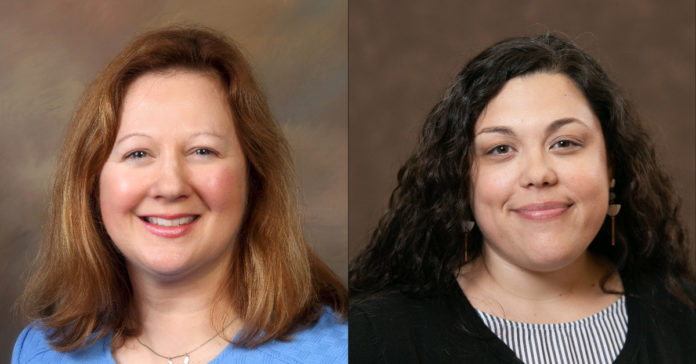Mercer University faculty Dr. Vicki Luther and Dr. Laura Simon share a passion for creating inclusive classrooms, and they hope to pass their knowledge and ideas on to others through a podcast.
Dr. Simon, assistant professor of sociology, and Dr. Luther, associate professor of education, participated in the 2019-2020 Faculty Scholars Program through Mercer’s Quality Enhancement Plan. They attended conferences in the fall that addressed the topic of inclusive classrooms and then set out to develop a university-wide initiative that shared what they had learned.
Their plan to host an in-person faculty workshop in March was derailed by COVID-19, so they adapted their presentation into a multi-part podcast that’s now available online. The five episodes, produced by QEP Associate Director Hannah Vann Nabi for the University’s new Research That Reaches Out podcast, focus on why inclusive classrooms are important and how they can be created.
“Even though the main audience is faculty, there are benefits for individuals who are interested in the general idea of inclusion and equity given the current events in our world,” Dr. Simon said. “All listeners can benefit from learning about why representation matters and why they should be considerate of all spaces we create. If we’re really mindful, we can do something pretty exciting with how we invite people into those spaces.”
Dr. Simon and Dr. Luther explained that inclusive classrooms create an environment that encourages all students to succeed and recognize the strengths, differences and potential of all learners. That means taking into account things like how to help students with mobility or ability issues, the equity in which racial and ethnic groups are represented in the material covered, and giving students more choices for how they do assignments.
In the podcast, Dr. Simon and Dr. Luther address topics such as inclusive teaching tips and strategies, bias in the classroom, integrating antiracist practices, how professors can build an engaging class that strengthens students, and how to get to know students and recognize their individual needs.
“One of my larger goals as an educator and a scholar is to get people critically thinking about the idea that although we all share similarities, we also have individual experiences that shape our lives,” Dr. Simon said.
Small measures can make a big impact on whether students feel successful, valued and heard in class, and it’s the professor’s job to see what can be done to help if students don’t feel that way, Dr. Luther said. Professors aren’t being asked to reduce the rigor of their classes or redesign them but to keep some simple things in mind as they prepare their syllabi and lead their courses.
“My goal for this is to help others recognize that we are on this journey called life together,” she said. “There are so many things that we can learn from our students. If we can make one change or help one person to make change, we feel that can have a ripple effect that can be seen throughout Mercer and the community.”
It’s important for faculty and the community to create equitable spaces that honor diversity and value individual experiences rather than diminishing them, Dr. Simon said.
Professors should be continuously growing from their classroom experiences and shifting their teaching methods in response. For example, Dr. Simon said student feedback helped her see that the first textbook she used for her course on the sociology of race and ethnicity was reinforcing perceptions about particular racialized groups and that she was unintentionally confirming biases. She never used that book again, and this experience led her to diversify the types of readings she assigned and be very mindful of how she talks about broad groups of people.
Dr. Luther said she realized that she was only giving examples from her own perspective — a white female teacher — in her classes and inadvertently leaving out the male perspective. That made her become more aware of how she presents things to her students. When she first came to Mercer, she assigned students to groups for a project. After several students reached out to her, she discovered that she needed to be more flexible and allow students to choose their own groups to better coordinate schedules or let them work alone or with partners if they perform better that way.
“One of the things about inclusive classrooms is it’s always changing because no one is the same,” Dr. Luther said. “Laura and I have learned a lot about ourselves and our teaching. You learn from your errors. You learn from your miscues.”
Listen to the inclusive classroom podcast episodes, which are labeled as episodes 7-11, below or on the Research That Reaches Out Podcast page, where transcripts are also available.









